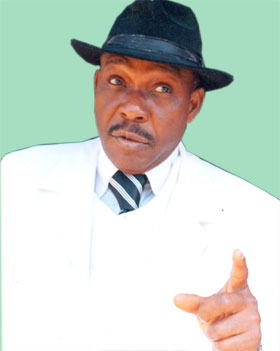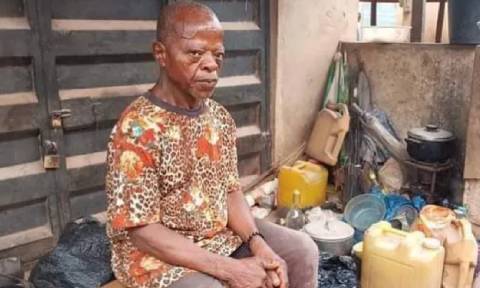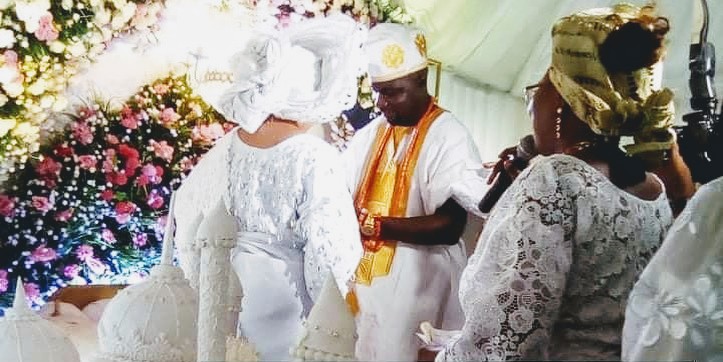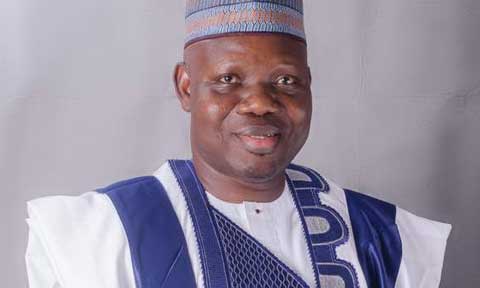
Delta state-born ace-actor Peter Bunor is not a happy man. Reason, he’s pissed off that despite his attempts to acquaint people with the correct pronunciation of his surname, they have continued to mispronounce it as Bruno.
“I’m bitter” , he said, adding “my name is Peter Bunor and up till this point that I speak to you, I don’t know why people still call me Bruno. I have tried to make them know my real names and since this is not working out, so I have decided to let the matter rest eternally.’ In this memorable encounter, Peter takes us through the length and breadth of his 30 years sojourn in the movie industry. He also shares his dreams and aspirations for the industry that has given him fame and honour.
Excerpt;
Where have you been hiding all these years?
I’ve been very much around. I have been busy with a project. The project is to celebrate my 30 years on screen and it’s a training programme for the youths. I have always wanted to do something that will make people remember me when I’m gone and this particular project is called The Peter Bunor’s Legacy which aims at empowering the youths through acting.
I’m happy to let you know that I’ve trained about two hundred youths in the last one year in Delta State. By the way that’s where I come from.
I decided to start from there because you know charity, they say, begins at home. After the training, they became part of a soap opera that I produced because it’s not just enough to train them and let them go like that.
This soap I’m talking about, has been submitted to Africa Magic and very soon, it will be on air. After the training, I also gave them copies of my handouts which is my legacy. These handouts contain all the rudiments of acting which can turn a potential actor into an award winning actor.
Those I trained were raw and fresh. In fact I made it compulsory that anyone who had acted before the training, was not eligible to participate. And I’m glad I got what I wanted. So you can start imagining what it is like having to turn stone into gold which is exactly what I did.
As I speak to you now, most of them are on various locations in Warri, Asaba. Just recently, one of them called to inform me that she has been given a lead role to play in a movie,which means that in no distant time, some of them will become stars. That is why people have not been seeing me around. The soap I produced will be screened on Africa Magic, Hi-Nolly, NTA and other TV stations.
How did you get the funds for this project?
I went to all the corporate bodies that are worth their onions in this country with this project. And all I got were promises. I also took this project to several state governments in this country. Though, I don’t want to mention names, even my own state government told me there was no fund. But I want to thank God who gave me this vision and I ‘m glad to have been able to accomplish it. If I tell you how this vision came to me, you’ll know that I didn’t make it up.
How?
I was sleeping one night and then something like a sharp tap woke me up. I heard a voice say “hey, next year you’ll be 30 years on screen. What will you tell your God that you did with the talent he bestowed on you if you drop dead now?”
When I woke up from what seemed like a dream, I went to my balcony because I couldn’t sleep again.
I kept wondering about the voice. It’s not as if I didn’t know that I’ll be 30 years on screen this year but I didn’t think of what to do afterwards. And that’s how I started thinking of this project. I decided to use my face to attract people to be part of the programme.
You started acting in Jos. Can we talk about how you came into acting?
Yes. I remember the first programme I did on NTV Jos before the creation of the Nigerian Television Authority (NTA) in the 80s. Then, I was part of a local soap called ‘Mirror’. The first time I faced the camera, I was shaking like a machine gun. In fact, I couldn’t voice a word.
From Mirror, I had a stint with Situation which was also a local TV programme in Jos. It was directed by Doll Johnson who’s now a Professor in UniJos.
Not too long after that, I got a role in the Peter Igho produced ‘Cock Crow at Dawn’ in 1981. And when I came on board, I was given a small part as one of those that sit under the tree (minors), called the co-orporative members.
But soon Peter was endeared to my way of acting, that he offered me the steady role of Batuk; a role played by Peter Badejo before he left for further studies in London.
Soon the man who made my role in Crow Crow At Dawn possible, Dejimo Louis, was invited to be part of the New Village Head master series as director. This started in 1984. Enebeli Enebuwa was his assistant director and I worked under them.
And from Cock Crow at dawn and the Village Headmaster, I was ushered into stardom. In the 80’s, there was virtually no soap opera on air which I didn’t feature in, from Second Chance, Third Eye, Memorial Hospital, Checkmate and several others.
More importantly, I was equally a model when I was young. I was in the Phensic advert for more than six years. You remember the song Phensic makes you well again’’(singing), I was that Phensic man. And some people still call me Phensic man till date.
Then with the advent of what we now call Nollywood in 1992, I played Chief Esiri in ‘Glamour Girls’ in 1994 and since then, I’ve lost count of the number of movies I’ve done. But I know it’s close to two hundred.
Were you also involved in stage productions?
The late Professor Sunny Oti who was the Head of Department, Theatre Arts, in UniJos, saw the way I was acting on screen and sent his students to get me for their stage performance called ‘The Inflation Magnet in 1982. I didn’t study
Theatre Arts; rather I studied Accountancy. But I played along with the Theatre Arts students of UniJos. While I was acting on stage in UniJos, we had people like Fred Amata too. Zack Amata was also a lecturer in the same University.
How would you describe the movie industry of yesteryears and that of today?
I would sincerely say that we had better story lines in the 90s than we have today. Today, we have more duplication of stories.
But in terms of technical quality, I think it’s getting better now because we’re using more sophisticated equipment compared to what we started with.
Glamour Girls, for instance, was shot with a Super VHS camera and I can tell you that it will be a crime for anybody to shoot a movie with a Super VHS today.
Of all your movie roles which would you say was your most challenging?
I’ll pick just one; which is a movie we shot in Ghana in 1999 titled Time. I played Amos the Punisher a mad man, a rich man, a poor old man and a deadly killer; all four roles in one movie. I killed an entire family and I did all these so uniquely that you’d think they were real.
But the most remarkable movie I’ve ever done is ‘Goodluck Jonathan The Man’. When Alamesiegha messed up and Goodluck took over, he did so much within one year that Rosemary Ingbi thought it wise to do a movie to showcase to Bayelsans his achievements as a Governor.
In that movie, I played the role of the Governor with all his virtues. And I tell you that, if he’s able to do same as the President, it will be so amazing. I was happy to play the role because of the razzmatazz that came with it.
And where is the movie?
The movie was not released because he went ahead to become the vice president. But I know that someday, the public will get to see it and know what it means to be a proactive leader. I know also that he has the capacity to do more than he did for the Bayelsa people in one year.
Lets talk about AGN. Do you think the present set of executives can take Nollywood to the next level?
I think it will be premature for one to say anything about the new executives because they’ve not even settled down to work. Segun Arinze is my very good friend and I can beat my chest to say he’s an ebullient and hardworking young man who’s very proactive. I know he will do well but he should not allow some people from the corner to confuse him.
Do you think movie premieres can help bring the Nigerian audience back to the cinemas?
I want to give kudos to the Yoruba film makers in this regard because they believe in the cinema culture which almost died in Nigeria. If not for the Silverbird family, this culture would have died completely.
But I think Silverbird still needs to do more to encourage the local producers.
They should show more Nigerian movies. I know that they don’t show some of our movies because they are of low quality but they can also sponsor some of these movies. That way the cinema culture can be revived.
How would you describe your 30 years on screen?
Let me put it in one sentence. Honestly, if I were in my right senses, I don’t know what I should be doing in the movie industry for 30 years. And I ask myself what am I still doing here?
But I want to let you know that I’m a fulfilled man. I like what I’m doing. In fact, if I have a second chance, I want to live and die an actor.
I don’t regret it. The only thing I regret is that I never branched off along the line to practice the accounting that I read. But I’m fulfilled. It will interest you to know that I’ve won some awards in Nigeria to show for my years in the industry.
Were you at any point a journalist?
In 1976, I took up a correspondent course in the London School of Journalism and got a diploma. Though I didn’t practice but that has helped my speech delivery very much.
Let me take you back to your days as a model, how were you able to handle the female folk?
As an actor and model, I had many women around me and I must be frank with you, I goofed as a bachelor and I want to ask God to forgive me for all that I did wrong.
My first daughter was born out of wedlock but I give God the glory. I was supposed to marry the mother but youthful exuberance did not allow me to do that. Why are you trying to remind me of those good old naughty years? Anyway, right now, that same daughter is in the University of Ibadan.
When I got married, I had another dughter and a son. My son used to be an actor (Peter Burno Junior) but I stopped him from acting and told him to face his education. By God’s gace, today, he’s at the verge of gaduating from the University.
How do they cope with a father who’s always on location?
They have no choice but to get used to my life style. Until recently, there’s no month I’m not on location. I’ll say I’m the most patronised Nigerian actor in Ghana. That is why Ghana is like a second home for me. I’m more cherished there.
Why is everybody going to Ghana for production?
Please don’t say that I’m not patriotic but the truth has to be told. And that is, what exists in Ghana is law and order.
I’m not trying to say that Ghana is not corrupt but each time I leave Ghana to come back home and face this incessant black out, I feel ashamed of myself and the government. Do you know that you can hardly see where they sell generators in Ghana?
But recently, I saw somebody hawking generator on a Lagos street like they hawk groundnut and pepper. He was saying Era generator O (Generator for sale).
And what part of Lagos was that?
I was driving around Suru-lere.
How many generators was he carrying?
Just one. And I parked my car to watch him. Soon I saw two people doing the normal bargaining with him until one of them bought it.
He went in, brought another one and continued his trade. And I said if it has come to this level, then it will take God to bail us out of this blackout.
Let me answer your question on why some producers prefer to go to Ghana. It is simple. It’s just a marketing strategy. If I produce with both Ghanian and Nigerians, I’ve gotten leverage on the two market base. As I speak with you now, more than hundred movies are being shot in Asaba so you can’t compare that to those shot in Ghana.
Asaba has become the melting point today, you know it used to be Enugu. But the people of Enugu took us for granted at a time so much that they charged you for putting down your generator by the side of somebody’s house. It became too expensive and that’s why we decided to try Asaba. Today it is a divine turn around for the people of Delta State.
A word for upcoming actors…
Acting is not for lazy people or school drop outs. Develop yourself educationally before going into acting so that when it fails, you can think of something to live on.



















